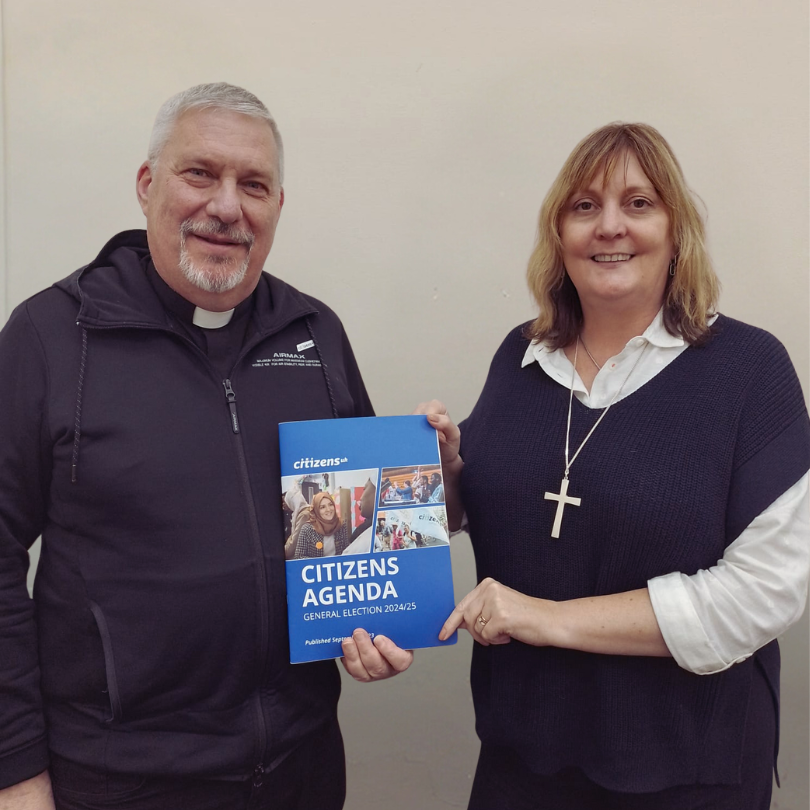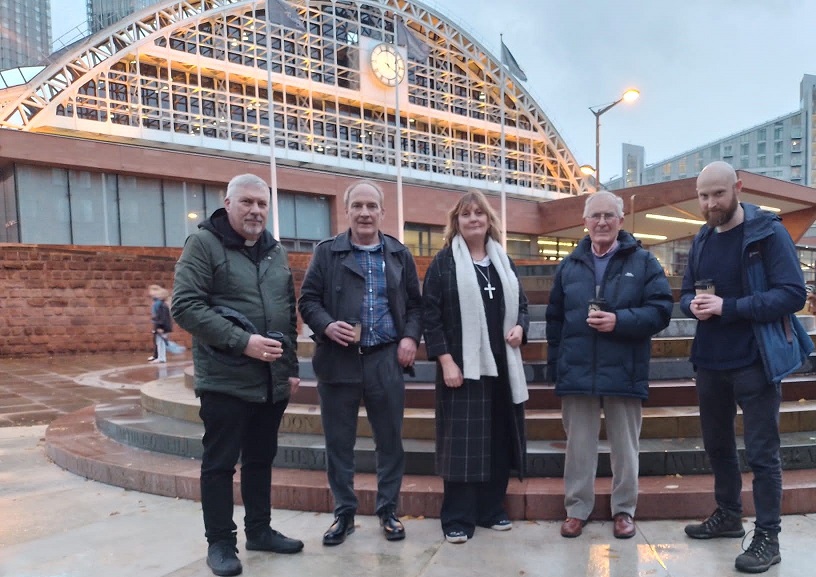The Reverend Ian Rutherford is part of the ministry team at Methodist Central Hall, Manchester. Ian has leadership roles in a wide range of social action and social justice initiatives, including being part of the leadership team for Greater Manchester Citizens, the Faith Sector Lead on Homelessness and Housing for Greater Manchester Mayor Andy Burnham, and Chair of the Greater Manchester Food Security Network. Kerry recently caught up with Ian to find out how community organising influences his work.

Kerry: Ian, thank you for being willing to chat. I’m just going to ask you a few questions about how you first discovered community organising, what difference it’s made to you, and where you think faith comes into it. So, let’s begin at the start. Where did you first encounter community organising?
Ian: Well, I’ve always been a networker and an activist. So, I’m used to being involved in causes. But I think community organising has brought a very different sort of feel to my work now.
My story is that the late Neil Jameson, who was the founder of Citizens UK, came along to Central Hall in Manchester one morning, just after I started as City Centre Minister there. He wanted to ask me whether I had heard that there was going to be a new Citizens UK chapter within Greater Manchester and that they were building a coalition of people and planning something called a Mayoral Assembly.
My story is that the late Neil Jameson, who was the founder of Citizens UK, came along to Central Hall in Manchester one morning, just after I started as City Centre Minister there.
He wanted to ask me whether I had heard that there was going to be a new Citizens UK chapter within Greater Manchester and that they were building a coalition of people and planning something called a Mayoral Assembly.

It sounded a bit like a network and something I was familiar with. He explained that it was based on Community Organising principles, which essentially begin with listening. The different member institutions in the chapter had been involved in listening campaigns for the last year, to try and understand what they were going to put to the mayoral candidates. It sounded fascinating. He then made a pitch to me, which was to say, most of our chapters have got Methodists in them, and they are brilliant. He said that Methodists get it; because they’ve always been community organisers, from the very start of their movement. And so he said that I needed to be involved. If you ever met Neil Jameson, you would know that he was a very forthright character, and very good at getting people on board. So I was convinced! I spoke to our District Chair to propose that we as a Methodist District become fully engaged in this. And we have been since the founding Assembly in 2017.
I do learn an awful lot from being part of the Greater Manchester Citizens Chapter, but I think we, as Methodists, have contributed a lot too. Because you see, I think, although we’re involved in broad based community organizing, it is also faith rooted. It must be something that comes out of my own self- interest, which is being a person of faith. We as Methodists have always been good at listening to the community, listening to God, listening to the hurts, but also listening to the strengths of the people that we work amongst. That has been part of our whole DNA as Methodists, from the very start.
Kerry: Have you got a particular story, or an example, of a time that really confirmed for you that community organising was an effective way of seeking justice and transformation?
Ian: Yes, for me it’s in the detail around shaping an action. That having listened and having heard what the issue is, it’s the work that’s then done by everyone in the Chapter, to really frame a proper ‘ask’ to those who’ve got the power, to make the change. Making it really clear about what it is that we’re after, what it is we want to see changed, has been a game changer for me. Because we can talk and come up with slogans and carry placards, but you’ve got to get down to the heart of the issue and how change actually happens.
One example I can share is around the Real Living Wage campaign. One of our first actions as Greater Manchester Citizens was in relation to Methodist Homes, asking them to pay the Real Living Wage to everyone they employed. And they listened, and they did what we asked. They were the first care organization in our country that actually did it- paid the Real Living Wage to all employees. Then we focussed on other organisations, such as the University of Manchester. It’s a huge university with many ancillary staff that were not being paid the real living wage. We had so many people that got involved in that campaign action from all our member institutions. Now not only are the University of Manchester paying the Real Living Wage to every single person in the estate, but they are now a Principal Partner in the Greater Manchester Citizens chapter. That is what happens- the right actions build a momentum, they become a movement.
And more recently, we’ve been working with care workers on a national level. Our big story locally is that we decided to go and do an action outside our local hospital in Salford. Next door to that was a private care company called Anchor. So we decided to also pop into there and have a conversation with the management. We were not only well heard, but they told us almost immediately that they were going to pay the Real Living Wage to all of their staff. We thought they meant just in that care home. What they meant was every single one of their care homes in the country. We reckon we secured £92 million pounds worth of money, just from that action! But it all started with the listening to care workers; to the people who are directly affected. Then using the stories we had heard, to frame the real ‘ask’, and having the people power, the collective power, to put that ask to those who have the power to act on it.
What’s interesting for me, always, is the actual breadth of the coalition, of those involved in Citizens UK. So obviously, we are there as Methodists, but in our Chapter, there is also the Roman Catholic Diocese, two mosques, a synagogue, a trade union, two universities, three schools, and loads of charities involved. So as soon as you turn up somewhere, and stand there, you look diverse, you are diverse, and you are able to speak with real power from your own member institutions. That’s the joy for me of being involved in community organizing.
Kerry: My final question is about how being involved in community organising has changed, or reshaped how you understand social justice and social action, from your faith perspective?
Ian: There are two significant things for me. The first is how we deal with power. That’s something that’s important within community organising principles. How we are aware of our own power, as people of faith, and making sure that we are not using it for the wrong reasons. It’s not just even about the sharing of power, it’s the giving away of power that we need to be open to, because that is how Jesus was. I think community organising has really helped me understand the importance of being clear about what we do with power including our own and how we speak to people of power, or perceived power; speaking truth, to power.
The second thing is hope. Because for me, it’s the hopeful imagination that comes into play here, the prophetic imagination, because as Christians we can imagine something of the world as it should be, not the world as it is. And so being able to use our spiritual gifts in that sense to be able to speak hopeful expressions to others, to remind them that all we do is moving towards a new order of things, a new future.

Leave a Reply